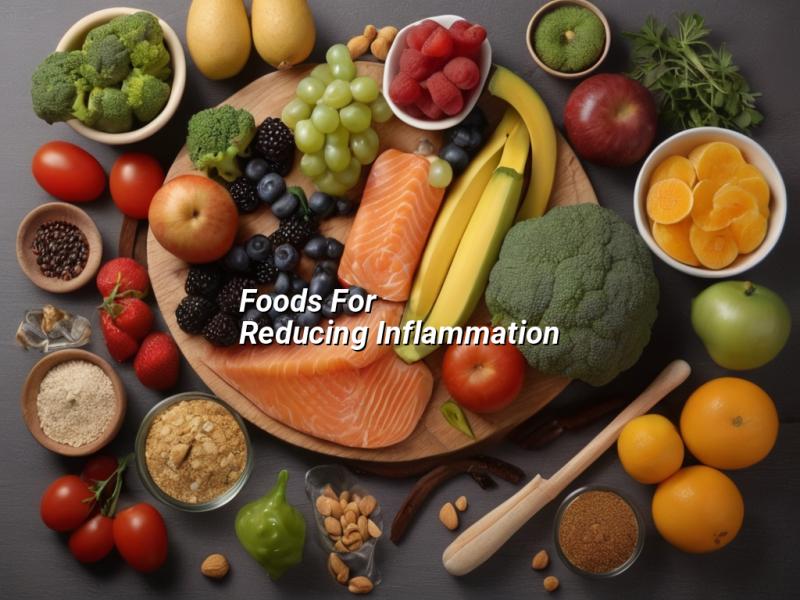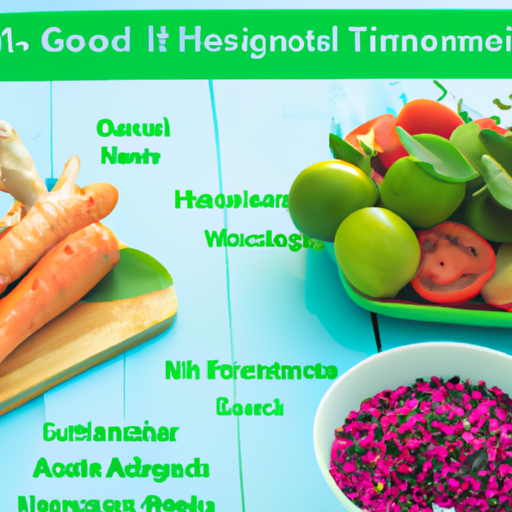Foods For Reducing Inflammation

The Top 10 Anti-Inflammatory Foods to Add to Your Diet
If you’re looking to reduce inflammation in your body, you’re in luck! There are plenty of delicious and nutritious foods that can help you do just that. Here are the top 10 anti-inflammatory foods to add to your diet:
1. Salmon: Salmon is packed with omega-3 fatty acids, which are known to reduce inflammation.
2. Berries: Berries are full of antioxidants, which can help reduce inflammation.
3. Broccoli: Broccoli is a great source of vitamin C, which can help reduce inflammation.
4. Spinach: Spinach is full of antioxidants and anti-inflammatory compounds.
5. Nuts: Nuts are a great source of healthy fats, which can help reduce inflammation.
6. Olive oil: Olive oil is full of healthy monounsaturated fats, which can help reduce inflammation.
7. Turmeric: Turmeric is a powerful anti-inflammatory spice.
8. Green tea: Green tea is full of antioxidants, which can help reduce inflammation.
9. Garlic: Garlic is a great source of allicin, which can help reduce inflammation.
10. Ginger: Ginger is a powerful anti-inflammatory root.
Adding these anti-inflammatory foods to your diet can help reduce inflammation and improve your overall health. So, why not give them a try? Your body will thank you!
How to Incorporate Anti-Inflammatory Foods into Your Everyday Meals
If you’re looking to reduce inflammation in your body, you’ve come to the right place! Incorporating anti-inflammatory foods into your everyday meals is a great way to support your overall health and wellbeing. Here are some tips to help you get started.
1. Start your day with a smoothie. Smoothies are a great way to get a healthy dose of anti-inflammatory ingredients in one go. Try adding ingredients like turmeric, ginger, blueberries, and spinach to your smoothie for a delicious and nutritious start to your day.
2. Add spices to your meals. Spices like turmeric, ginger, and cinnamon are all great anti-inflammatory ingredients. Try adding them to your meals for an extra boost of flavor and nutrition.
3. Incorporate healthy fats. Healthy fats like olive oil, avocados, and nuts are all great sources of anti-inflammatory nutrients. Try adding them to your meals for an extra dose of healthy fats.
4. Eat more fish. Fish like salmon, mackerel, and sardines are all great sources of omega-3 fatty acids, which are known to reduce inflammation. Try adding them to your meals for an extra dose of healthy fats.
5. Incorporate more fruits and vegetables. Fruits and vegetables are packed with antioxidants and other anti-inflammatory compounds. Try adding them to your meals for an extra dose of nutrition.
By incorporating these anti-inflammatory foods into your everyday meals, you can help reduce inflammation in your body and support your overall health and wellbeing. Give it a try and see how you feel!
The Benefits of Eating an Anti-Inflammatory Diet
If you’re looking to improve your overall health and wellbeing, then an anti-inflammatory diet may be the answer. Eating an anti-inflammatory diet can help reduce inflammation in the body, which can lead to a range of health benefits. Here’s a look at some of the benefits of eating an anti-inflammatory diet.
1. Improved Digestive Health
Eating an anti-inflammatory diet can help improve your digestive health. This is because it focuses on eating whole, unprocessed foods that are rich in fiber and other nutrients that can help keep your digestive system running smoothly. Eating an anti-inflammatory diet can also help reduce inflammation in the gut, which can help reduce symptoms of digestive disorders such as irritable bowel syndrome (IBS).
2. Reduced Risk of Chronic Disease
Inflammation is linked to a range of chronic diseases, including heart disease, diabetes, and cancer. Eating an anti-inflammatory diet can help reduce inflammation in the body, which can help reduce your risk of developing these diseases.
3. Improved Mental Health
Eating an anti-inflammatory diet can also help improve your mental health. This is because it focuses on eating foods that are rich in essential nutrients, such as omega-3 fatty acids, which can help reduce inflammation in the brain and improve mood.
4. Increased Energy Levels
Eating an anti-inflammatory diet can also help increase your energy levels. This is because it focuses on eating nutrient-dense foods that can provide your body with the energy it needs to function properly.
If you’re looking to improve your overall health and wellbeing, then an anti-inflammatory diet may be the answer. Eating an anti-inflammatory diet can help reduce inflammation in the body, which can lead to a range of health benefits, including improved digestive health, reduced risk of chronic disease, improved mental health, and increased energy levels. So, if you’re looking to improve your health, then give an anti-inflammatory diet a try!
The Role of Omega-3 Fatty Acids in Reducing Inflammation
Inflammation is a natural response of the body to injury or infection, but when it becomes chronic, it can lead to a variety of health issues. Fortunately, there are ways to reduce inflammation and omega-3 fatty acids are one of them.
Omega-3 fatty acids are essential fatty acids that are found in certain foods, such as fish, nuts, and seeds. They are also available in supplement form. Omega-3 fatty acids have been shown to reduce inflammation in the body, which can help to reduce the risk of chronic diseases such as heart disease, diabetes, and arthritis.
Omega-3 fatty acids work by reducing the production of inflammatory compounds in the body. They also help to reduce the activity of certain enzymes that can cause inflammation. Additionally, omega-3 fatty acids can help to reduce the risk of blood clots, which can lead to heart attack and stroke.
Omega-3 fatty acids can be found in a variety of foods, including fish, nuts, and seeds. Fish is the best source of omega-3 fatty acids, but you can also get them from plant sources such as flaxseed, chia seeds, and walnuts. Supplements are also available if you don’t get enough omega-3 fatty acids from your diet.
If you’re looking for a way to reduce inflammation and improve your overall health, adding omega-3 fatty acids to your diet is a great place to start. They can help to reduce inflammation and reduce the risk of chronic diseases. So, make sure to include plenty of omega-3 fatty acids in your diet and consider taking a supplement if needed.
The Impact of Spices and Herbs on Reducing Inflammation
If you’re looking for a way to reduce inflammation in your body, you may want to consider adding some spices and herbs to your diet. Spices and herbs have been used for centuries to help reduce inflammation and improve overall health.
Inflammation is a natural response to injury or infection, but when it becomes chronic, it can lead to a variety of health problems. Chronic inflammation can increase your risk of developing heart disease, diabetes, and even cancer. Fortunately, there are a number of natural remedies that can help reduce inflammation and improve your overall health.
One of the most effective natural remedies for reducing inflammation is adding spices and herbs to your diet. Spices and herbs contain a variety of compounds that can help reduce inflammation. For example, turmeric contains curcumin, which has been shown to reduce inflammation and improve overall health. Other spices and herbs that can help reduce inflammation include ginger, garlic, cayenne pepper, and cinnamon.
In addition to reducing inflammation, spices and herbs can also help improve your overall health. Many spices and herbs contain antioxidants, which can help protect your cells from damage caused by free radicals. They can also help boost your immune system and improve digestion.
Adding spices and herbs to your diet is an easy and delicious way to reduce inflammation and improve your overall health. Try adding some of these spices and herbs to your meals and see how they can help reduce inflammation and improve your health.





